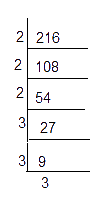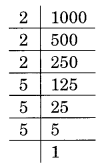Which of the following numbers are not perfect cubes?
(i) 216 (ii) 128 (iii) 1000 (iv) 100 (v) 46656
Solution:
Cube root is the number that needs to be multiplied three times to get the original number.
For a number to be a perfect cube, all its prime factors should exist in triplets.
(i) 216

216 = 2 × 2 × 2 × 3 × 3 × 3
= 23 × 33
∴ 216 is a perfect cube
(ii) 128

128 = 2 × 2 × 2 × 2 × 2 × 2 × 2
= 23 × 23 × 2
∴ 128 is not a perfect cube
(iii) 1000

1000 = 2 × 2 × 2 × 5 × 5 × 5
= 23 × 53
∴ 1000 is a perfect cube
(iv) 100

100 = 2 × 2 × 5 × 5
= 22 × 52
∴ 100 is not a perfect cube
(v) 46656

46656 = 2 × 2 × 2 × 2 × 2 × 2 × 3 × 3 × 3 × 3 × 3 × 3
= 23 × 23 × 33 × 33
∴ 46656 is a perfect cube
☛ Check: NCERT Solutions for Class 8 Maths Chapter 7
Video Solution:
Which of the following numbers are not perfect cubes? (i) 216 (ii) 128 (iii) 1000 (iv) 100 (v) 46656
NCERT Solutions for Class 8 Maths Chapter 7 Exercise 7.1 Question 1
Summary:
The numbers that are not perfect cubes among the given numbers (i) 216 (ii) 128 (iii) 1000 (iv) 100 (v) 46656 are 128 and 100
☛ Related Questions:
- Find the smallest number by which each of the following numbers must be multiplied to obtain a perfect cube.(i) 243 (ii) 256 (iii) 72 (iv) 675 (v) 100
- Find the smallest number by which each of the following numbers must be divided to obtain a perfect cube.(i) 81 (ii) 128 (iii) 135 (iv) 192 (v) 704.
- Parikshit makes a cuboid of plasticine of sides 5 cm, 2 cm, 5 cm. How many such cuboids will he need to form a cube?
- Find the cube root of each of the following numbers by prime factorization method. (i) 64 (ii) 512 (iii) 10648 (iv) 27000 (v) 15625 (vi) 13824 (vii) 110592 (viii) 46656 (ix) 175616 (x) 91125
visual curriculum